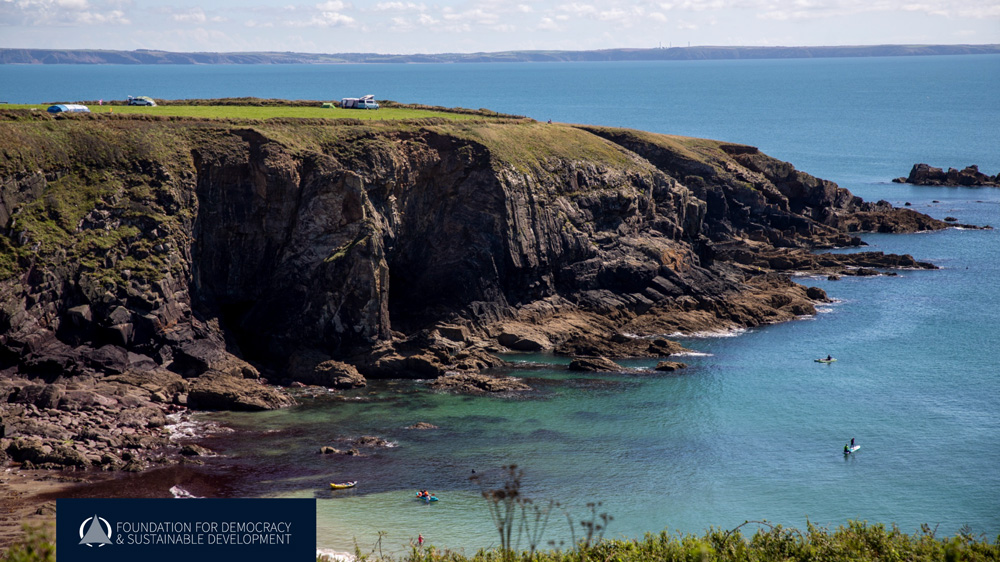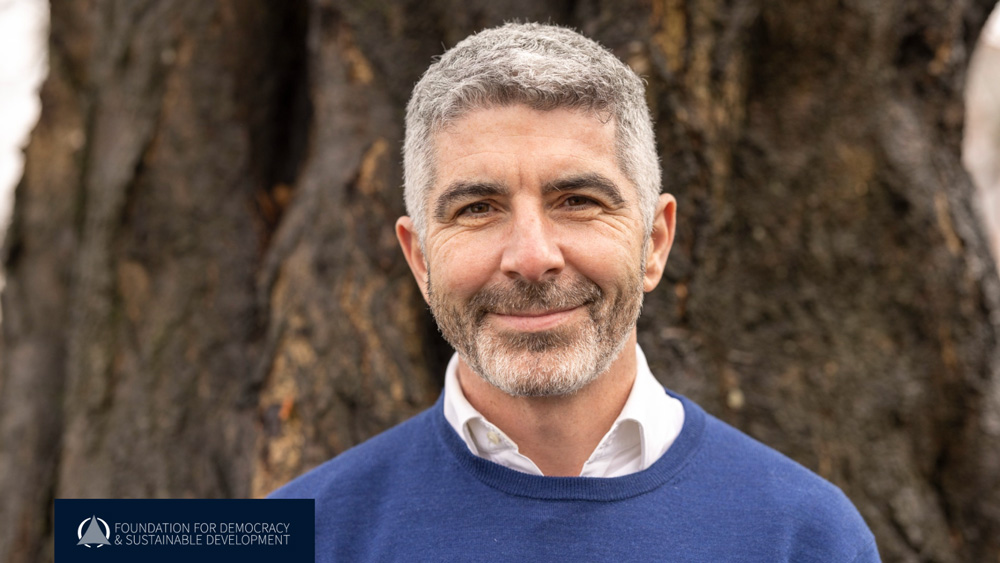In this provocation, Peter Davies offers personal reflections on his role in the development of the Future Generations Commissioner for Wales within the broader story of the journey of devolution – a journey that started with the duty to promote sustainable development in the initial Government of Wales Act. His role in this story begins in 2006 when he was appointed to the UK Sustainable Development Commission as Commissioner for Wales. This is a version of Peter’s talk at ‘A Future Commissioner for the UK?’ event in London, 11 April 2017.
. . .
I am delighted to have the opportunity to join Sándor Fülöp in sharing our different experiences through our perspectives as FDSD trustees.
For my part, I will offer a mix of personal reflections on my role in developing the Future Generations Commissioner for Wales and the story of the devolution journey – a journey that started with a duty to promote sustainable development embedded in the Government of Wales Act.
My personal role began in 2006 when I was appointed to the UK Sustainable Development Commission (SDC) as Commissioner for Wales. It is worth remembering that we have already had a UK-wide institution established by government to provide advice and to hold governments to account in ensuring that policies contribute to sustainable development. That was the SDC.
It is interesting to re-read the final statement from the commission at its untimely termination in 2010:
The establishment of the Sustainable Development Commission (SDC) in 2000 was, in part, a recognition that government is not yet structured to be able to rise above the limitations of short-term political and budgetary cycles and narrow departmental remits to make the kinds of long-term decisions and connected responses that these major challenges demand.
Finally, it will also be essential to find ways of hard-wiring this approach over successive political cycles. A Sustainable Development Act? A Commissioner for the Long Term? An Office for Future Generations? All have been mooted for the UK by a range of stakeholders and some have been established, or are being planned, in other countries, as a way of taking the future well-being of people and our planet out of short-term parliamentary cycles and partisan politics.
Indeed, it was the demise of the SDC at the stroke of a minister’s pen that strengthened the resolve of the Minister for Environment and Sustainability in Wales, Jane Davidson, to introduce proposals for sustainable development legislation and a statutory independent commissioner into the Labour Party manifesto for the 2011 Welsh Assembly elections and to commit to maintain my appointment as an independent commissioner with the new title of Sustainable Futures Commissioner.
That manifesto commitment led to a process that ended with the 2015 Well-Being of Future Generations Act – a significant name change from the proposed Sustainable Development Act. The act emerged an extensive national conversation, The Wales We Want. The result was seven national goals and the appointment of a statutory Future Generations Commissioner, Sophie Howe, all of which became operational in April 2016.
Over that period I had the real honour to help shape the new legislation and build links to the UN Sustainable Development Goals.
Looking back over my role as commissioner, I was able to work with some brilliant people and organisations across business, public and voluntary sectors – right across Wales and beyond – and to roam across ministerial portfolios. This all happened in a role with no powers, no direct levers, and no direct budget; ministers could terminate it in a month, but it had the grand title of Sustainable Futures Commissioner! Much of my time was spent working across boundaries, connecting silos, building networks, convening unusual suspects and being an honest broker to provide a safe space for dealing with difficult issues.
The nature of the Future Generations Commissioner was also influenced heavily by the contribution of partners, such as FDSD (including its publication The Democratic Case for an Office for Future Generations), The World Futures Council, Stakeholder Forum and the Oxford Martin Now for the Long Term report.
The white paper referred to established best practice principles for such a body:
- be independent and strong enough to be critical of government when needed;
- have responsibility for recommending and monitoring key indicators of progress;
- be focused on problem solving;
- bring an interdisciplinary approach;
- the need to draw on high-level cross-sector representation;
- enable joint action from across sectors;
- ensure strong civil engagement to underpin its role; and
- be established for the long term with stable resources
The legislation clearly sets out the powers and duties of the commissioner, along with the functions that the commissioner can undertake to fulfil these duties.
Duties and powers
Part 3 of the legislation defines the commissioner’s general duty:
(a) to promote the sustainable development principle, in particular to—
(i) act as a guardian of the ability of future generations to meet their needs, and
(ii) encourage public bodies to take greater account of the long-term impact of the things that they do, and
(b) for that purpose to monitor and assess the extent to which well-being objectives set by public bodies are being met.
In carrying out this duty, the commissioner may provide advice or assistance to the public goals; encourage best practice amongst public bodies to meet their well-being objectives; promote awareness; undertake research among others, on “anything related to any of those things that impacts upon the economic, social, environmental and cultural well-being of Wales (or any part of Wales)” and conduct a review “into the extent to which a public body is safeguarding the ability of future generations to meet their needs by taking account of the long-term impact of things the body does”.
The commissioner must also, every five years (a year before the general election), prepare and publish, a Future Generations Report, which contains the commissioner’s assessment of the improvements public bodies should make to set and meet well-being objectives in accordance with the sustainable development principle.
One year in, we now have a fully staffed Office of the Future Generations Commissioner, with a budget of £1.5million to deliver the new legislation, provide advice (for example on the M4) and continue the process of civic engagement to set priorities for the work programme across four challenge areas:
- Climate change – focusing on reducing emissions and tackling impacts
- Economic change – shifting to an economy that is fit for the future
- Population change – tackling the challenges and opportunities of an ageing population, the changing composition of our communities, and the importance of early years and adverse childhood experiences
- Citizen disengagement – championing public participation and involvement in decision making
The commissioner has also built upon the international links with other institutions with similar functions through the Network of Institutions for Future Generations. We are proud to be part of that movement, which is building structures to support sustainable development within the democratic system. Each country needs to build structures related to their particular context. In Wales, the role of commissioners is well established as part of our governance in other spheres such as the Welsh Language, Older Persons and Children’s Commissioners. This approach is inextricably integrated into the Wellbeing of Future Generations Act. It provides an example of a model designed to improve decision making for the long term. While it may not be applicable to other countries or even other parts of the UK, it is critical we build in structures that can enable democratic systems to take into account the needs of future generations.
Download
The provocation is available in pdf.
Image: Lake Vyrnwy (CC-BY 2.0) Les Haines / Flickr.com



